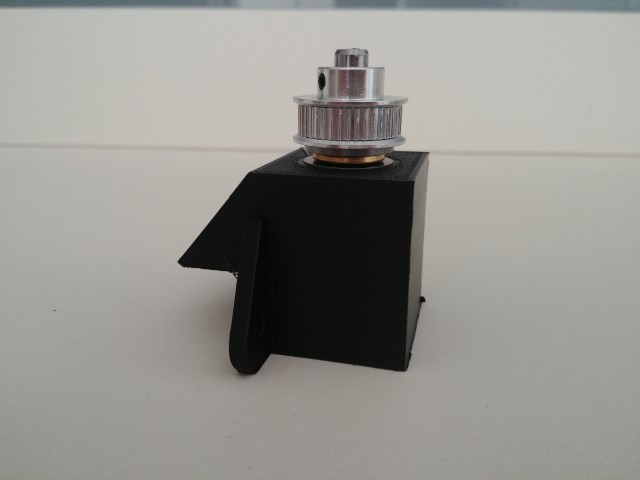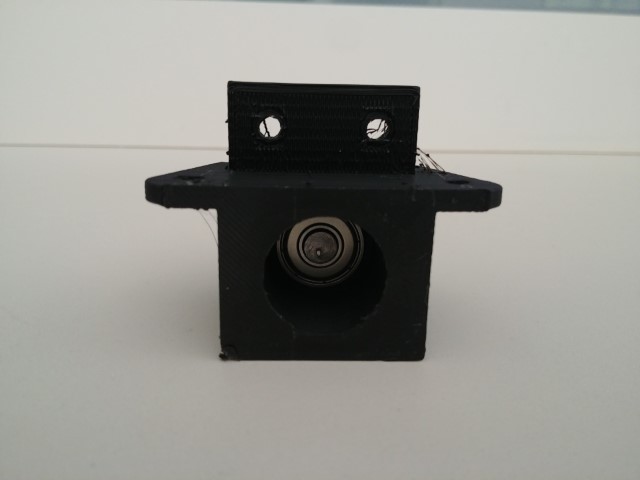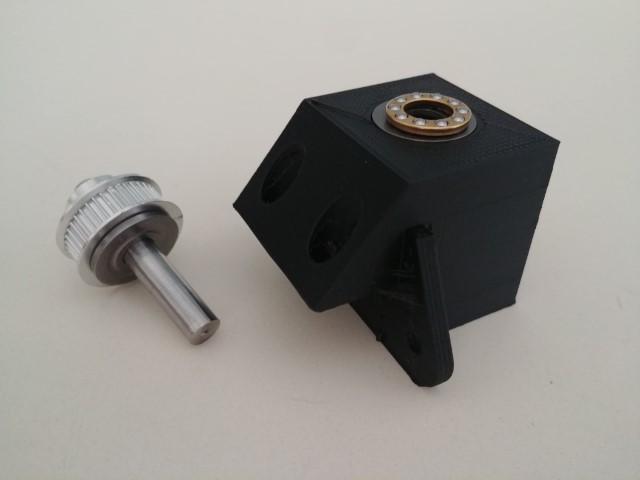Best lead screw - ball bearing mount system
-
what about sfu1204. you would not need the coupler.
-
Is the pulley for belt reduction or tying the three lead screws to one stepper?
If the former I would recommend worm reduction drive instead to reduce the chance of the elevator driving itself down under it's own weight. I was going to look into breaks for my belt reduction system but someone rightly pointed out worm reduction was potentially a better option.
-
@doctrucker From other posts, I think he was gunning for a continuous belt/single motor (but I could be wrong).
The simplest way to prevent the weight of the bed from driving the screws is to use a finer lead screws with correspondingly shallower helix angles.
Worm drives are OK (ish) - the problem is eliminating backlash. If you have a sufficiently heavy bed and a very steep helix angle on the thread (very course lead), then gravity will take care of any backlash, but finer lead screws are all together a simpler and (IMO) more elegant solution.
-
@doctrucker said in Best lead screw - ball bearing mount system:
Is the pulley for belt reduction or tying the three lead screws to one stepper?
If the former I would recommend worm reduction drive instead to reduce the chance of the elevator driving itself down under it's own weight. I was going to look into breaks for my belt reduction system but someone rightly pointed out worm reduction was potentially a better option.
I think his lead screws are 2mm pitch/lead single start, so shouldn't have much auto rotation potential.
-
On my corexy using makerslide. I have only a 608 bearing and the pulley keeping the tr8-8 in place with gravity. One belt runs the two leadscrews from the stepper motor at 2:1. The bed will move down if I press hard down on it, otherwise it doesn't move.
-
If your bed is mounted rigidly and can't move in X or Y, then the lead screw really doesn't have to be all that good. I use a floating lead screw nut because lead screws aren't perfect, but the linear rails that my bed is mounted to is precise. I've seen ZERO artifacts from the float.
-
@gnydick I'll second that. Lead screws should only provide lift, guides should only guide. I had a bit of an accident a few months ago and bent one of the lead screws. I've never got around to straightening or replacing it because it prints perfectly. The screw might wobble a bit, but one rotation still gives me exactly 1mm of linear movement.
-
@deckingman I had the exact same thing happen!!
-
Thank you for all your suggestions.
This is what come out .
I moved the thrust bearing on the top so it can discharge the weight of the bed on the plastic structure.
Below I installed the ball bearing that doesn't have to manage weight.
I am still waiting for the rigid coupler.what do you think
?



-
Looks good to me.
-
That'll do.
-
With this sort of thing I tend to think about what might go wrong and what I can do to prevent it. I try to only have to do things once. Making things as close to ideal (in the relevant properties) as possible reduces the things you have to consider if something goes wrong. If I use a plastic part in an assembly I tend to make it bulky to ensure rigidity, so I wouldn't use thin plastic flanges, even with side-webbing, to support a relatively large weight or something that will be loaded by a drive belt.
At the very least I would thicken the flange that bolts to the top side of the t-slot, maybe to the point of making it continuous with the body of the part. I'm not saying that your flange design won't be adequate, but if it isn't, you'll be redesigning and reprinting.
In the end, you should worry less about the plastic flexing and more about the t-slot it's bolted to twisting.
-
@mrehorstdmd
is something like this enough "bulky"?
-
Yes, I'd do something like that. I'd also use modifier meshes to increase the fill density around the mounting bolt holes.
-
that reminds me there was a video by alex kenis about this
https://www.youtube.com/watch?v=2Z7mZVvPlc8 -
While I am trying to fix the squareness of the frame I finalized!the Z axis belt system
This is what it came out.
I tried to make the belt running as much as possible around the pulley with this setup all the pulley has 180 degree belt contact.
The 2 tensioners are temporary , I am going to print a support for it
Any suggestion will be appreciated.
Thank you
Andrea

-
@claustro How come those front two lead screws are set so far back from the front of the frame?
-
@deckingman this is only a temporary disposition , at the end the 2 front lead screw will be as far as possible from the back one
-
@claustro said in Best lead screw - ball bearing mount system:
@deckingman this is only a temporary disposition , at the end the 2 front lead screw will be as far as possible from the back one
Ah OK. I was a bit concerned that the two side rails might flex due to the weight of the bed acting so far away from the end fixings. Those "Tee plates" might flex though. If you can, check for any deflection by using a dial gauge if you can lay your hands on one, and adding a weight to simulate the weight of the bed to the top of the lead screw couplings.
-
I am trying to use your Z rail configuration with only 2 carriage in a diagonal disposition .
If you talking about the plastic tee plate , the one that fix the 2020 that support the 2 front lead screws, I am going to switch to aluminum one as soon I 'll have my CNC running . ( it will be my first easy test with aluminum )
)I have a dial gauge and I surely check what you suggest.
